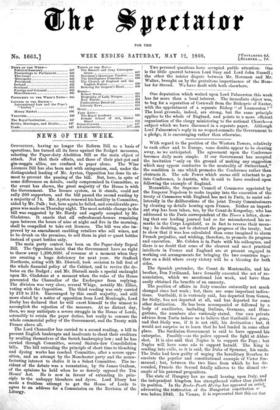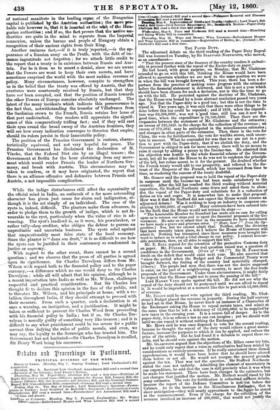With regard to the position of the Western Powers, relatively
to each other and to Europe, some doubts appear to be clearing away, as we anticipated. The agreement upon the Conference becomes daily more simple. If our Government has accepted the invitation "only on the ground of making any suggestion which may appear conducive to the neutrality of Switzerland," the condition is one which promotes the Conference rather than obstructs it. The sole Power which seems still reluctant to go into Conference, is Austria, who is said to have resolved upon following the example of England.
Meanwhile, the Supreme Council of Commerce appointed by the Emperor Napoleon to make inquiry into the execution of the treaty of Commerce with England has met in Paris, to assist col- laterally in the deliberations of the joint Treaty Commissioners by clearing up details bearing upon France. Rather an import- ant step has been taken, too, by the Count de Kergorlay, who has addressed to the Paris correspondent of the Times a letter, show- ing that our leading journal had so far misunderstood his re- marks in the Corps Legislatif, as in fact to reverse their mean- ing; he desiring, not to obstruct the progress of the treaty, but to show that it was less calculated than some imagined to alarm French prejudice, and wishing, therefore, to promote its progress and execution. Mr. Cobden is in Paris with his colleagues, and there is no doubt that some of the clearest and mo,4 practical intellects in France and England are at present engaged in working out arrangements for bringing the two countries toge- ther on a field where every victory will be a blessing for both sides.
The Spanish pretender, the Count de Montemolin, and his brother, Don Ferdinand, have formally executed the act of re- nunciation, which we mentioned last week, and have thus easily obtained the benefits of an amnesty.
The position of affairs in Italy remains outwardly not much changed since last week ; but, there are some important indica- tions. Garibaldi, it is variously said, has departed from Genoa, for Sicily, has not departed at all, and has departed for some other destination. He has been accompanied or followed by a body of auxiliaries, including Italians' Germans, and Hun- garians, the numbers also variously stated. Our own private adviees from Turin induce us to believe that Garibaldi has gone, and that Sicily was, if it is not still, his destination ; but, it would not surprise us to learn that he had landed in some other place. The Sardinian Government is said to have opposed his enterprise. Possibly—as the police opposed the fight at Alder- shot. It is also said that Naples is to support the Pope ; but Naples will have some ado to support herself. The King is
sending into exile, so it is said, the Duke of Syracuse his uncle. The Duke had been guilty of urging the hereditary bourbon to emulate the popular and constitutional example of Victor Em- manuel; but, between the two lines from which he has de- scended, Francis the Second fatally adheres to the dismal ex- ample of his paternal progenitors.
The state of Hungary has no small bearing upon Italy, and the independent kingdom has strengthened rather than yielded its position. In the Buda-Pesth Hirlap has appeared an article - advocating the restoration of the Hungarian constitution 9- was before. 1848. In Vienna, it is represented that this out that of national manifesto in the leading organ of the Hungarian capital is published by the Avstrian authorities; the sore Fo- bable tale however is, that it IV inserted at the wh of the Hun- garian authorities; and. N so, the fact proves that the illative au- thorities are quite in the mind to separate from the Imperial connexion, unless the barons and people of Hungary obtain a recognition of their ancient rights from their King. Another ominous fact,—if it is truly ,"reported,—is the ap- pearance of a Russian army on the Pruth, with the debt of im- mense ingratitude not forgotten ; for we attach little credit to the report that a treaty is in existence between Russia and Aus- tria. Far be it from us to assert a denial, since we are aware that the Powers are wont to keep their own secrets, and have sometimes surprised the world with the most sudden reverses of policy. Many circumstances, however, conspire to strengthen us in the belief that the treaty was offered by Austria, that the overtures were courteously received by Russia, but that they have not been accepted, and that the position of Russia towards the other Powers of Europe remains absolutely unchanged. The latest of the many incidents which indicate this perseverance is the fact that, notwithstanding the transfer of Nlllafranca from the Sardinian crown to the French, Russia retains her lease of that port undisturbed. Our readers will appreciate the signifi- cance of this comparatively trifling fact ; and if they will cast their eyes round the broad sweep of the Austrian frontiers, they will see how every indication converges to threaten that empire, should its rulers persist in their lamentable policy. The position of the Prussian Government is curious, charac- teristically equivocal, and not very hopeful for peace. The Prussian Government has disclaimed the declaration of M. Vincke, that the Federal Diet sits by an illegal tenure ; the Government at Berlin for the hour abstaining from any move- ment which would render Prussia the leader of Northern Ger- many, and break with Austria. This circumstance may be taken to eonfirm, or it may have originated, the report that there is an alliance offensive and defensive between Prussia and Austria, a not impossible complication.



























